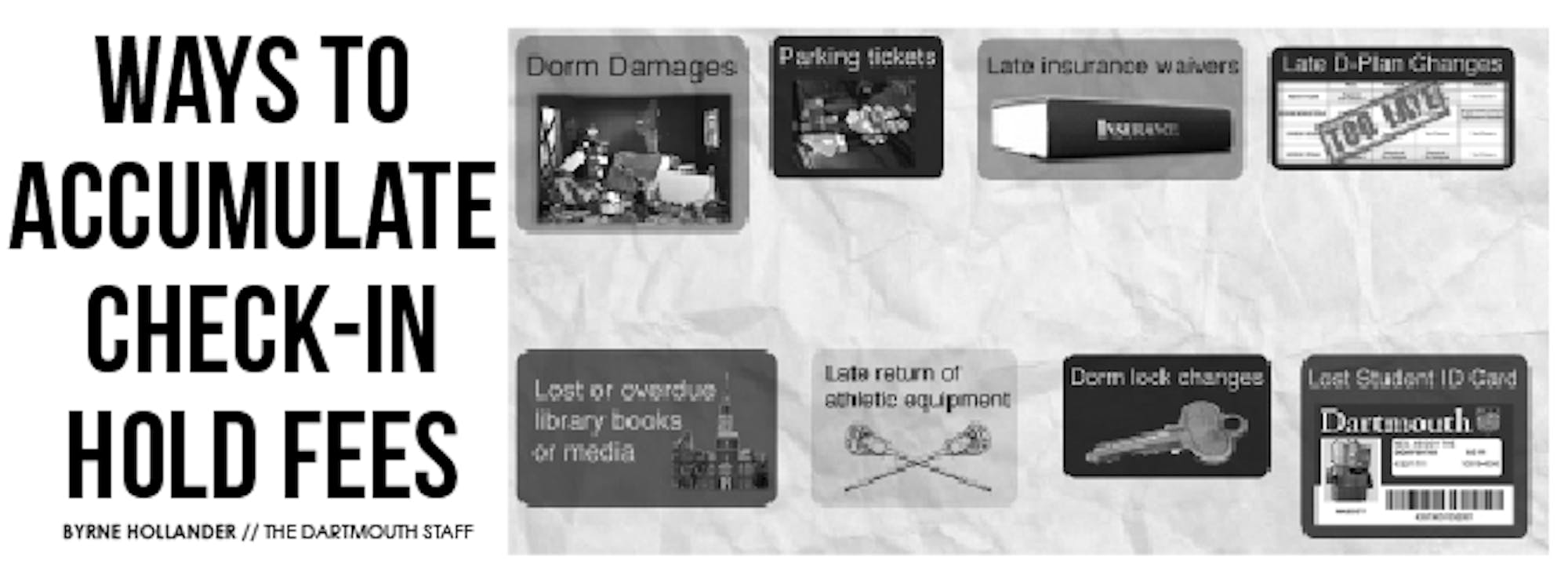The email came last Friday afternoon with a clear message and simple instructions. “All students in residence are required to officially check-in online,” it read, providing a one-click path to Banner Student. After the first deadline on Wednesday, students could still check in with a $50 late fee tacked on. Until checking in, students cannot receive credit for classes and may even face administrative withdrawal.
Despite these daunting consequences, the check-in process itself is relatively simple. All students have to do is log onto Banner Student and click a few links. If all goes well, a yellow smiley face congratulates you.
For most students, the trials of check-in end there. But for others, administrative holds prevent checking in and further unsettle the already hectic few days at the start of each term.
Student financial services instates financial holds — called bursar holds — if a student has an outstanding balance of $500 or more on his or her D-Pay account after scholarships, financial aid, payment plans and explanation forms have been factored in to the total, director of student financial services Kathryn Page said.
The student must pay the balance in full or negotiate a payment plan before student financial services lifts a hold, Page said. Students must pay the balance out of pocket or arrange loans and scholarships with the financial aid office to cover the difference.
Sandi Caalim ’13 will graduate this spring, and she said she can only remember one term without having a check-in hold. She spends the first few days of most terms in and out of the financial aid office, juggling the stress of tuition negotiations with the first week of classes. Dealing with the monetary concerns of check-in holds makes it feel impossible to start the term, Caalim said.
Furthermore, the process of negotiating loans to overcome check-in holds creates a distinct difference between students who do and do not struggle with financial issues, she said.
“Check-in holds reminds me, in a way, that maybe I’m not allowed to be here,” Caalim said.
Just like Caalim, Janelle Bullock ’15 can only recall one term at Dartmouth when she could check in on time, without a hold.
“I’ve never had a good time with check in,” Bullock said. “Ever.”
Although Bullock’s parents have consistently paid her tuition and expenses on time, Student Financial Services has been late to process payments, Bullock said. At the start of each term, she now sets aside time to visit student financial services in person, where she must have a representative manually process her tuition payments and lift the hold from her account.
“It’s really obnoxious,” Bullock said. “I know I’ll go on Banner Student, I know I have a check-in hold, and I have to go deal with it.”
While Page said she wasn’t aware of the specifics of Bullock’s situation, she said that such a situation should not have happened.
For Bullock and Caalim, check-in holds have become a routine headache at the start of each term. For others, holds crop up unexpectedly and come as a shock.
At the beginning of winter, Madeline Parish ’16 logged on to Banner around 10 a.m. on the final day to check in and found that a bursar hold had been placed on her account. If she could not resolve the hold to check in by 4 p.m. that day, she would face a $50 fine on top of the balance she already owed.
“I felt like there was a kind of weird disconnect in that I was getting notified,” Parish said. “I didn’t know how to fix the problem. I felt like they should have alerted the person who pays for the schooling.”
Parish’s father, who pays for her education, had accidentally missed a bill and later realized that an email had slipped through the cracks, Parish explained. Although she resolved the unexpected hold relatively quickly, Parish barely met the deadline. The stressful combination of the intense time crunch and the impending fee created an overall frustrating situation, she said.
“They’re saying, ‘There’s an issue with you paying money. Please pay us or you have to pay more,’” Parish said.
Tyler Rivera ’16 was also shocked to discover that a check-in hold had been placed on his account at the start of last winter term, when his scholarships from a separate organization were not automatically applied to his Dartmouth tuition.
“I was kind of freaking out,” Rivera said. “It was completely unexpected. I had no idea that my scholarship wasn’t going to be applied to my tuition balance.”
Rivera, who handles all the finances for his education himself, had previously met with both student financial services and the financial aid office, and was well-equipped to resolve the situation. Even so, Rivera still found himself working against the deadline, checking in three hours before the deadline.
Check-in related issues unfold during the first three days of term, amid shopping for classes, resolving housing problems and coming to terms with the depressing reality that spring is actually just winter with a few more daylight hours. The extreme time crunch imposed by deadlines can compound the natural stress that comes at the start of every term. For some students, the process creates an administrative nightmare — but the added stress and the $50 fee are usually as bad as it gets.
At some colleges, Page explained, having a check-in hold can prevent students from receiving a room key, signing up for classes or using the meal plan.
Dartmouth is different, Page said, as check-in holds do not harshly penalize students or cause them to fall behind with classes. The fee is in place to motivate students to submit payments on time, she said, and a student who feels their fee is unjustified can submit a waiver form to appeal it.
There’s no doubt that resolving check-in holds is often a hassle. The process of bouncing between administrative offices consumes the few relatively relaxing days of term we’re afforded before work really picks up. The solution? Try to check in early. If an issue arises, contact the associated office as soon as possible and figure out what needs to be done. And if there’s a hold on your account this year, don’t fret.
“Usually,” Page said, “we work something out.”
The article has been revised to reflect the following correction:
Correction appended: March 28, 2014
The original version of this story incorrectly identified the term in whichMadeline Parish '16 had a hold. It is winter, not spring, and the story has been revised to correct the error.




